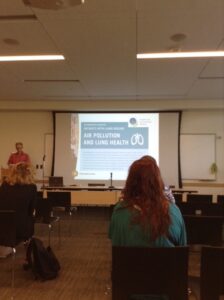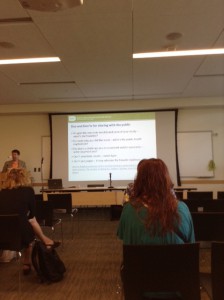Publish or perish has long been the mantra of academic research. While this used to be limited to peer-reviewed journals, researchers are increasingly needing to include public outreach through social media to their list of communication vehicles. A recent panel at the International Society for Environmental Epidemiology conference this week in Seattle tackled this problem with some practical advice.
Publish or perish has long been the mantra of academic research. While this used to be limited to peer-reviewed journals, researchers are increasingly needing to include public outreach through social media to their list of communication vehicles. A recent panel at the International Society for Environmental Epidemiology conference this week in Seattle tackled this problem with some practical advice. With a focus on the environmental factors that can impact public health, the researchers at this conference have a definite need to reach a broad audience base not just to justify their grant money but to positively impact public health and the environment with their findings.
Disseminating scientific research to the general population is not an easy task. Media outlets like easy wins and definitive statements, but research results often need the fine print to be fully understood, and the fine print often contains details like study methodology or influencing factors that either are too complicated for the general public or limit the results of the findings to very specific situations. For example, perhaps a drug proves effective but only in left-handed blind mice that could play the tuba. This might be a big scientific breakthrough pointing towards broader benefits, but it’s not conclusive enough for media that want to say things like “New drug 100% effective” not “Drug thought to be effective in tuba-playing left-handed blind mice.”
One audience member, who worked in communications for a large research organization summed up this problem as “if a headline meets my criteria no media outlet would pick it up.” That is, by the time the headline was completely scientifically unambiguous, like our blind mice example, it didn’t seem like news.
The session featured real world examples and best practices from http://escapeproject.eu/ and from the NIH. The ESCAPE project was a multi-year study to evaluate the effects of air pollution from birth to death across a wide range of respiratory and other illnesses. You can understand why getting this information beyond academic readers to the general public is so important.
Some tips:
- The communications plan needs to be part of the grant-writing process, and for studies that impact public health, you need to think beyond PubMed to the general press and social media.
- Know what channels your audience accesses. Are they on Twitter or Facebook or maybe print media?
- Understand what larger story your research is part of and position it within that context. For example, for ESCAPE, it’s the impact of air pollution on health.
- Understand the implications of your research for the general public. What action do you want them to take based on your findings?
- Avoid scientific jargon.
- Make sure you can distill the main message from the study, and as conclusively as possible within the parameters of your research topic.
- Leverage partner organizations for their press and communications contacts and to disseminate the message. For example, the ESCAPE project used respiratory related health organizations to help spread the word about their findings.
- Photos can be a powerful way to get attention and disseminate information. Here ESCAPE found that photos of major cities obliterated by smog were very effective to accompany news articles about their study results.
- Don’t dismiss the Kardashian Index. Some researchers downplay the value of social media because the most popular scientists on social media are often doing the least amount of research and possibly not the best researchers. However rather than making them shy away from social media as a result, the presenters urged the audience to participate more actively to make sure their voices and research were heard. Popularity and valid information do not need to be mutually exclusive.
As active social media participants here at Wellpepper, we have a couple of additional recommendations for researchers:
- Try not to name your study with an acronym. Studies usually have very long names and then acronyms are coined as a short cut. However, they usually don’t convey the actual meaning of the study. “ESCAPE” is an acronym for European Study for Air Pollution Effects. How about “Smog Europe?” ;). A descriptive name with a subtitle is a lot easy for the general public and news media to grasp.
- Infographics can be a great way to communicate a lot of data-rich information like this one from the NIH about social media influence within an online medical community. Put your contact and study information on the infographic and make it easy for people to redistribute. (We didn’t include the NIH graphic here because it required emailing them for permission.)
Even within the session attendees that represented researchers from across the globe and in all career stages, there was a great digital divide. One young researcher implored her older colleagues to use Facebook to engage with scientists and potential scientists of her generation. She also mentioned that it was a great place to recruit study subjects. Another researcher from Chile talked about the power of social media for collecting data: getting reports from people on the ground who were facing environmental health challenges. This could have been a topic unto itself, and if more deeply explored might have convinced some of the more curmudgeonly audience members who were concerned about the current proliferation of communications channels, lack of ubiquitous digital access, and a worldwide decline in scientific literacy.
In the age of social media, the idea of publish or perish takes on new relevance and meaning, and hopefully scientists and researchers understand that embracing these new ways to engage directly with the general public will amplify the impact of their work.










